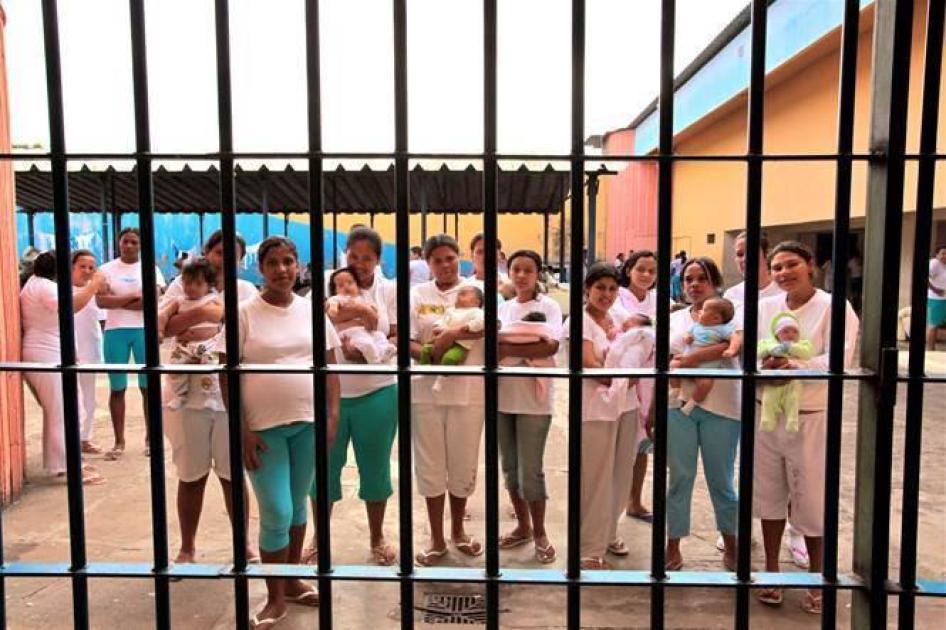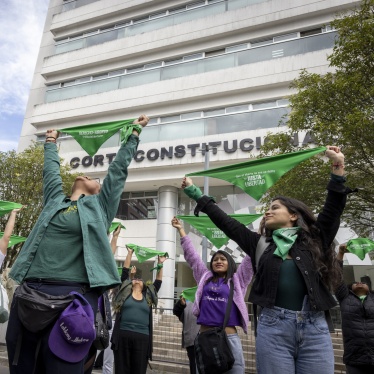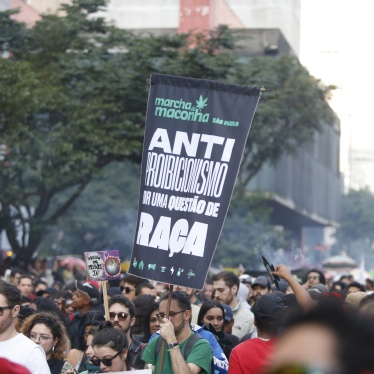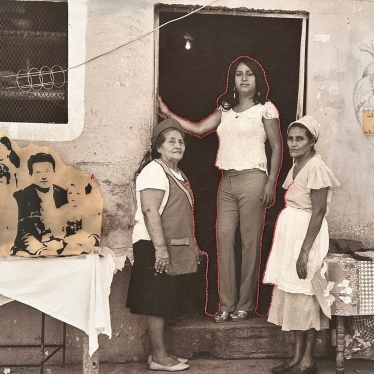Brazilian mothers of small children and of people with disabilities and pregnant women accused of non-violent crimes remain in pretrial detention despite a new law that expressly prohibits this, Human Rights Watch said today.
An analysis of data released under a Freedom of Information request reveals that courts have been slow to implement new legal protections for mothers and pregnant women, in some cases ignoring them entirely.
In 2018, a series of Supreme Court rulings and a new law placed strict new limits on courts’ power to order pretrial detention for mothers and pregnant women. The law now mandates house arrest instead of pretrial detention for pregnant women, mothers of people with disabilities, and mothers of children under 12, except for those accused of violent crimes or of crimes against their dependents.
Yet data from 2018 shows that thousands of women who appear to have been entitled to these protections remained behind bars in pretrial detention. More recent data from Rio de Janeiro state indicates that the problem has persisted in 2019.
“Brazilian law could not be clearer that the mothers of small children or of people with disabilities and pregnant women should not be behind bars while awaiting trial for non-violent crimes,” said Maria Laura Canineu, Brazil director at Human Rights Watch. “Yet there are worrying signs that some judges are ignoring these protections, leaving mothers who have not been convicted of a crime to spend Mother’s Day in overcrowded, unsanitary cells instead of at home with their families.”
The latest available data from the Justice Ministry’s National Prison Department (DEPEN), obtained by Human Rights Watch through a Freedom of Information Request, show that in September 2018, judges had released fewer than a third of the women who should have been released absent “exceptional” circumstances. This left more than 6,000 behind bars awaiting trial.
While there are no national data available for the period after September 2018, Human Rights Watch was able to access more recent data collected by the Public Defender’s Office in Rio de Janeiro state to see whether there had been any change there. From August 13, 2018 through December 18, 2018, the Rio Public Defenders´ Office identified 53 women who should have been subject to house arrest rather than pretrial detention absent “exceptional” circumstances. Judges kept 43 (81 percent) in pretrial detention, granting house arrest to only 10 (19 percent).
On December 19, Brazil adopted a law that made the range of cases where judges might lawfully subject pregnant women and mothers to pretrial detention even narrower than it already had been. From December 19, 2018 through the end of February 2019, public defenders identified 39 women who should, without exception, have been subject to house arrest rather than pretrial detention under the new law. But judges ordered pretrial detention for 31 (79 percent) and house arrest for only 8 (21 percent).
In January, in one example, a Rio de Janeiro judge ordered the pretrial detention of a mother who was accused of drug dealing because, the judge said, she put her children at risk and hurt their development with her criminal activity –even though she had not been convicted. The judge concluded she was a “bad example” for the children.
Human rights law mandates that when concerns about flight risk, interference with evidence, or safety require authorities to place certain conditions on pretrial release, non-custodial measures should be used when possible rather than pretrial detention, which should be “a means of last resort.” Under article 9(3) of the International Covenant on Civil and Political Rights (ICCPR), pretrial detention should “not be the general rule.”
The International Covenant on Economic, Social and Cultural Rights calls for “the widest possible protection” of the family. The Convention on the Rights of the Child observes that children need special safeguards and care, and requires officials to assess and take into account a child’s individual best interests in all matters affecting the child.
The United Nations Rules for the Treatment of Women Prisoners and Non-custodial Measures for Women Offenders, known as the Bangkok Rules (2010), which Brazil’s Supreme Court cited in its February 2018 ruling, state that “when sentencing or deciding on pretrial measures for a pregnant woman or a child’s sole or primary caretaker, non-custodial measures should be preferred where possible and appropriate, with custodial sentences being considered when the offence is serious or violent.”
Since early 2018, Brazil’s Supreme Court and its previous government adopted strong, practical efforts to protect the rights of pregnant women and mothers facing trial, and to protect the rights of their dependents. Brazil’s judges should adhere to them, Human Rights Watch said.
“The legal criteria are clear: If they are fulfilled, the incarceration is unlawful,” Judge Luís Lanfredi, who directs the prison and juvenile detention department at the National Council of Justice, told Human Rights Watch. “Legal changes require changes in mindset and decision-making by judges. The National Council of Justice is committed to helping judges adopt these criteria in their rulings.”
For further discussion of the data and judicial decisions, please see below.
Strong, New Steps to Protect Pregnant Women and Mothers
In a February 2018 ruling, Brazil’s Supreme Court required house arrest instead of pretrial detention in jails for pregnant women, mothers of children or adults with disabilities, and mothers of children under 12, who are accused of non-violent crimes and who did not commit crimes against their children, unless judges found the circumstances of the case to be “very exceptional.” The decision did not preclude judges from ordering them released awaiting trial.
This ruling established protections that went far beyond those earlier laid out under a 2016 law giving judges broad authority to grant house arrest, instead of pretrial detention, to pregnant women and women and men who have children under 12 or provide “indispensable” support to children and adults with disabilities.
In its February 2018 ruling, the Supreme Court held that the prison system had “systematically violated” the rights of women and their children due to “degrading” detention conditions that violate Brazil´s Constitution. The court noted that two-thirds of pregnant women in prison have inadequate prenatal care, and that children born in prisons are sometimes kept in cells and later abruptly separated from mothers. The court also highlighted the negative effects of a mother’s incarceration on the physical and psychological well-being of her children.
In October 2018, Justice Ricardo Lewandowski, who wrote the majority opinion in the February 2018 decision, ruled in another case that “the view that the mother who deals drugs puts her children at risk and, because of that, does not deserve house arrest, has no legal basis.” And in January 2019, Lewandowski also held that recidivism “in principle… does not preclude the rule of substituting pretrial detention for house arrest.”
In December 2018, Brazil built upon these judicially-mandated protections by adopting Law 13,769/2018. This law made it mandatory for judges to grant house arrest instead of pretrial detention to pregnant women and mothers of or women who are “responsible” for children under 12, or for people with disabilities of any age, except for those accused of violent crimes or of crimes against their dependents. The earlier Supreme Court ruling had allowed judges to deny house arrest only in “very exceptional cases,” which judges would need to justify. The law, however, made house arrest rather than pretrial incarceration in jails mandatory in all circumstances, with no exception for “exceptional” cases.
Prison Conditions
The National Prison Department told Human Rights Watch its latest data on the total number of women incarcerated was from June 2016. At that time, more than 42,000 women were housed in facilities built to hold 27,000 people. Forty-five percent of the women in detention – 19,000 – were awaiting trial.
While Brazilian law requires jails and prisons for women to provide special units for pregnant women and women with babies up to six months old, only 16 percent of detention facilities had them as of June 2016. And just three percent had preschool facilities for children under 7, also required by law. Only one gynecologist was available for every 1,500 incarcerated women.
In October 2016, Human Rights Watch documented illegal prison conditions at Bom Pastor women’s prison in Recife, which also had deficient prenatal care and no postnatal care. Human Rights Watch researchers interviewed several mothers who cried while holding their infants, dreading the time when their babies would turn six-months old and prison officials would remove them from their care, as the prison had no facilities to keep them. The children were sent to live with relatives or to foster care.
Pretrial and convicted women were held in the same cells at Bom Pastor, in violation of Brazilian law and international standards.
Failure to Implement Protections
After the February 2018 ruling, the National Prison Department asked the states’ prison authorities to estimate the number of women in detention who fulfilled the criteria established by the Supreme Court unless they represented “exceptional” cases, and the number of those who had in fact been granted house arrest. State prison authorities estimated in September 2018 that 9,245 women in pretrial detention since the ruling met the criteria, but that judges had granted house arrest to only 3,073 – fewer than a third.
As of September 2018, judges in some states, including Paraiba, Piauí, and Maranhão, had applied the Supreme Court ruling in more cases than state prison officials initially estimated it would implicate. But in others, judges mostly ignored it. Judges in Rio Grande do Sul applied it in nine percent of estimated qualifying cases and in Acre in two percent. Judges in São Paulo, the state with Brazil’s largest prison system, applied it in only 46 percent of estimated qualifying cases.
In Rio de Janeiro, state prison officials estimated in September 2018 that 491 women in jail fulfilled the criteria, but judges had granted house arrest to only 60 (12 percent).
Some judges denied house arrest on the basis of what appear to be erroneous interpretations of the Supreme Court ruling.
In São Paulo, an appeals court judge refused, in March 2018, to grant house arrest to a woman accused of drug dealing who had an 11-year-old child. The judge said that the objective of the Supreme Court´s ruling was “to protect early childhood, especially children who are born in prisons, which is not the case of the petitioner, whose son is pre-adolescent.” Yet, the Supreme Court ruling applies equally to mothers of children born in or outside prison who are under 12 and not just those in “early childhood,” and applies to mothers of persons with disabilities of any age.
Some judges continued to deny house arrest even after the December 2018 law, which eliminated their discretion to classify a case as “very exceptional” and thus deserving of pretrial detention, was adopted.
In January 2019, a Rio judge denied house arrest to a mother, citing the alleged presence of drugs at her home. “There is no doubt that the children who live with her suffer much more risk from her freedom than from her imprisonment, and they can be temporarily hosted by a close relative,” the judge stated.
Judges in Rio de Janeiro made these kinds of assessments based on police reports and brief interactions with detainees at custody hearings, without any input from psychologists or social workers, the Rio Public Defenders’ Office told Human Rights Watch.
The Rio Public Defenders’ Office found that almost 70 percent of the women who fulfilled the criteria but were kept in pretrial detention after arrest from August 2018 to January 2019 were accused of drug dealing.
In February 2019, the Superior Court of Justice decided that judges should have the power to deny house arrest in very exceptional cases, based on risks that the woman may present to her own children or society, challenging the December 2018 law’s elimination of the discretion of judges to deny house arrest in exceptional cases. The Superior Court of Justice’s rulings can be appealed to the Supreme Court.
In March 2019, Rio de Janeiro Public Defenders’ Office petitioned the Supreme Court to grant house arrest to 20 women it identified as meeting the criteria who were in pretrial detention and to initiate disciplinary proceedings against judges who fail to abide by the February 2018 Supreme Court ruling and the December 2018 law.










